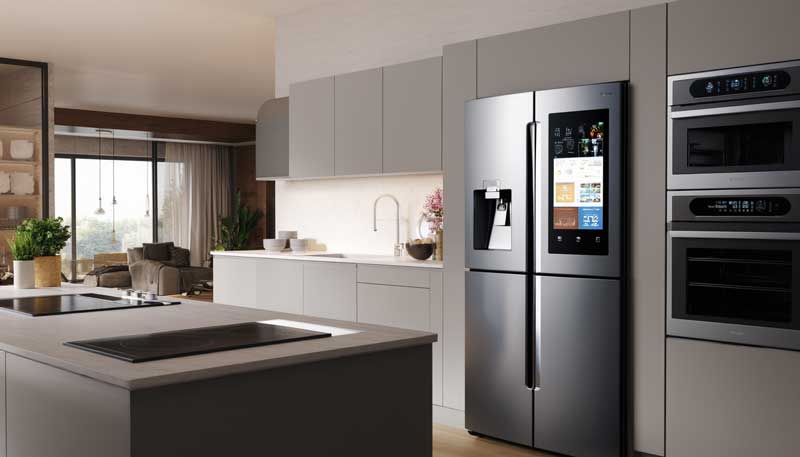Kitchen ➢ Smart Kitchen Trends
5 Smart Kitchen Trends That Will Transform Your Cooking in 2025

The kitchen is experiencing a technological revolution that goes far beyond smart refrigerators and voice-controlled lights. In 2025, smart kitchen technology focuses on precision cooking, waste reduction, and creating more intuitive culinary experiences that make cooking accessible to everyone, regardless of skill level.
These emerging trends aren't just about adding gadgets to your countertop—they're about fundamentally improving how we prepare, cook, and enjoy food. From AI-powered cooking assistants to precision temperature control, these innovations are making professional-quality cooking techniques available in home kitchens.
1. AI-Powered Cooking Assistants and Recipe Intelligence
Advanced AI cooking systems now act as personal sous chefs, guiding you through recipes with real-time adjustments based on your ingredients, preferences, and cooking skill level. These systems can analyze what's in your pantry and suggest recipes that minimize waste while maximizing flavor.
Smart cooking assistants learn your taste preferences, dietary restrictions, and cooking habits to provide increasingly personalized recommendations. They can adjust cooking times and temperatures based on your specific appliances and even suggest ingredient substitutions when you're missing something for a recipe.
2. Precision Temperature Control and Sous Vide Integration
Professional-grade temperature control is becoming standard in home kitchens through smart induction cooktops, precision ovens, and integrated sous vide systems. These tools ensure consistent results by maintaining exact temperatures throughout the cooking process.
Smart thermometers now connect wirelessly to your smartphone, sending alerts when food reaches perfect doneness and providing step-by-step guidance for complex cooking techniques. This technology eliminates guesswork and helps home cooks achieve restaurant-quality results consistently.
3. Automated Meal Planning and Inventory Management
Smart kitchen systems now track your pantry inventory, monitor expiration dates, and automatically suggest meal plans that use ingredients before they spoil. Connected scales and barcode scanners make it easy to keep accurate inventory without manual entry.
These systems integrate with grocery delivery services to automatically reorder staples when you're running low, and they can suggest meal plans based on sales and seasonal availability to help reduce grocery costs while maintaining variety in your diet.
4. Advanced Food Safety and Quality Monitoring
Smart sensors now monitor food safety throughout the cooking and storage process, alerting you to potential issues before they become problems. These systems can detect when food has been in the temperature danger zone too long or when refrigerated items need attention.
Connected appliances communicate with each other to ensure food safety—your smart oven can verify that meat has reached safe internal temperatures, while smart storage containers monitor freshness and suggest optimal usage timing.
5. Sustainable Cooking and Waste Reduction Technology
Smart kitchen systems now focus heavily on sustainability, helping reduce food waste through better planning, portion control, and creative use of leftovers. AI-powered meal planning considers what you already have and suggests recipes that use ingredients efficiently.
Energy-efficient smart appliances coordinate their operation to minimize energy usage during peak hours, while smart composting systems make it easier to dispose of food waste responsibly. Some systems even track the environmental impact of your cooking choices.
Integration and Ecosystem Approach
The most significant trend is the integration of all these technologies into cohesive ecosystems. Your smart kitchen doesn't just have individual smart appliances—it has appliances that communicate with each other to coordinate cooking processes and optimize results.
Voice control has evolved beyond simple commands to natural conversation. You can ask your kitchen assistant complex questions about cooking techniques, request recipe modifications for dietary needs, or get real-time troubleshooting help when something isn't going as planned.
Making Smart Kitchens Accessible
Perhaps most importantly, smart kitchen technology is becoming more affordable and easier to implement gradually. You don't need to renovate your entire kitchen—many smart cooking tools are countertop appliances or retrofittable devices that work with existing equipment.
The focus has shifted from showing off technology to genuinely improving the cooking experience. The best smart kitchen tools are those that fade into the background, quietly helping you cook better food more efficiently without adding complexity to your routine.
The Future of Home Cooking
As these trends continue to evolve throughout 2025, the most successful smart kitchens will be those that prioritize the joy of cooking while removing common frustrations. Technology should enhance creativity and confidence in the kitchen, not replace the fundamental pleasure of preparing good food.
The smart kitchens of 2025 represent a shift toward more intuitive, sustainable, and enjoyable cooking experiences that work with your lifestyle rather than requiring you to adapt to new technologies.
Share this article:
React to this article: